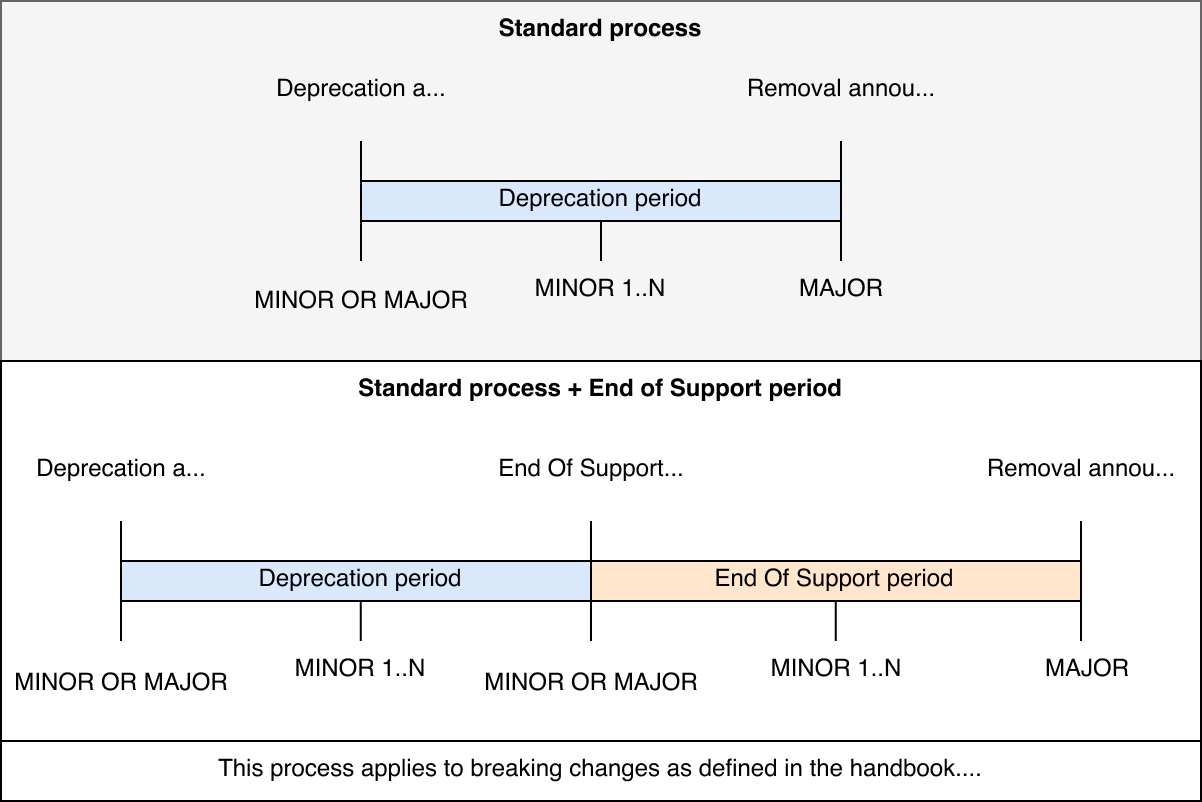Deprecating GitLab features
This page includes information about how and when to remove or make breaking changes to GitLab features.
Terminology
Deprecation:
- Required before ending support for a feature or removing a feature.
- Feature not recommended for use.
- Development restricted to Priority 1 / Severity 1 bug fixes.
- Will be removed in a future major release.
- Begins after a deprecation announcement outlining an end-of-support or removal date.
- Ends after the end-of-support date or removal date has passed.
End of Support:
- Optional step before removal.
- Feature usage strongly discouraged.
- No support or fixes provided.
- No longer tested internally.
- Will be removed in a future major release.
- Begins after an end-of-support date has passed.
- Ends after all relevant code has been removed.
Announcing an End of Support period should only be used in special circumstances and is not recommended for general use. Most features should be deprecated and then removed.
Removal:
- Feature usage impossible.
- Happens in a major release in line with our semantic versioning policy.
- Begins after removal date has passed.
Breaking change:
A "breaking change" is any change that requires users to make a corresponding change to their code, settings, or workflow. "Users" might be humans, API clients, or even code classes that "use" another class. Examples of breaking changes include:
- Removing a user-facing feature without a replacement/workaround.
- Changing the definition of an existing API (by doing things like re-naming query parameters or changing routes).
- Removing a public method from a code class.
A breaking change can be considered major if it affects many users, or represents a significant change in behavior.
When can a feature be deprecated?
Deprecations should be announced on the Deprecated feature removal schedule.
Do not include the deprecation announcement in the merge request that introduces a code change for the deprecation. Use a separate MR to create a deprecation entry. For steps to create a deprecation entry, see Deprecations.
How are Community Contributions to a deprecated feature handled?
Development on deprecated features is restricted to Priority 1 / Severity 1 bug fixes. Any community contributions to deprecated features are unlikely to be prioritized during milestone planning.
However, at GitLab, we give agency to our team members. So, a member of the team associated with the contribution may decide to review and merge it at their discretion.
When can a feature be removed/changed?
Generally, feature or configuration can be removed/changed only on major release. It also should be deprecated in advance.
For API removals, see the GraphQL and GitLab API guidelines.
For configuration removals, see the Omnibus deprecation policy.
For versioning and upgrade details, see our Release and Maintenance policy.
Update the deprecations and removals documentation
The deprecations and removals
documentation is generated from the YAML files located in
gitlab/data/.
To update the deprecations and removals pages when an entry is added, edited, or removed:
-
From the command line, navigate to your local clone of the
gitlab-org/gitlabproject. -
Create, edit, or remove the YAML file under deprecations or removals.
-
Compile the deprecation or removals documentation with the appropriate command:
-
For deprecations:
bin/rake gitlab:docs:compile_deprecations -
For removals:
bin/rake gitlab:docs:compile_removals
-
-
If needed, you can verify the docs are up to date with:
-
For deprecations:
bin/rake gitlab:docs:check_deprecations -
For removals:
bin/rake gitlab:docs:check_removals
-
-
Commit the updated documentation and push the changes.
-
Create a merge request using the Deprecations or Removals templates.
Related Handbook pages:
